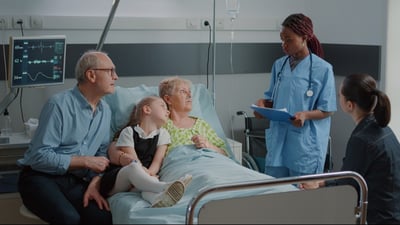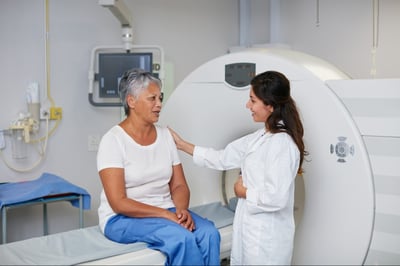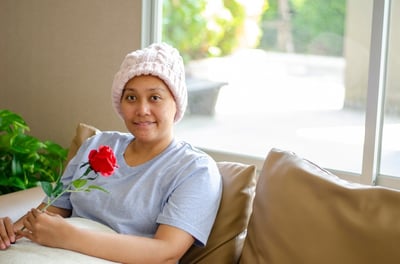Detrás de los titulares sobre el cáncer
Obtener más información sobre el programa de XRAY



Relevancia: Media
Este artículo es de mayor interés para: Personas que consideran someterse al proceso de conservación de la fertilidad
Estudio: Efectos del cáncer de mama y las mutaciones en el gen BRCA en la conservación de la fertilidad
Las conversaciones oportunas sobre planificación familiar son importantes para las personas diagnosticadas con cáncer de mama, al igual que para las personas que tienen una mutación hereditaria en los genes BRCA1 o BRCA2. Este estudio analizó la cantidad de óvulos maduros recolectados al momento de estimular los ovarios para la conservación de la fertilidad (proceso médico para guardar óvulos, espermatozoides o tejido reproductivo para que una persona pueda tener hijos en el futuro) o las pruebas genéticas preimplantacionales (análisis genéticos que se realizan en embriones antes de ser transferidos al útero para detectar alteraciones cromosómicas y genéticas) en los tres grupos de mujeres y se observó que la cantidad de óvulos recolectados fue similar. (Publicado el 31/10/24)
Leer más ›


Relevancia: Media-alta
Este artículo es de mayor interés para: Personas con cáncer interesadas en consumir cannabis para ayudar a tratar los síntomas.
Estudio: Consumo de cannabis para manejar los síntomas del cáncer
Entre las personas con cáncer, hay un gran interés por el consumo de cannabis para manejar los síntomas del cáncer y los efectos secundarios del tratamiento. La principal organización profesional de oncólogos (especialistas en el tratamiento contra el cáncer) del mundo ha publicado estrategias para ayudar a los adultos con cáncer y a los profesionales médicos a mantener conversaciones abiertas y sin prejuicios sobre el consumo de cannabis para tratar los síntomas del cáncer. (Publicado el 27/9/24)
Leer más ›


Relevancia: Alta
Este artículo es de mayor interés para: Personas cuyo cáncer de mama hizo metástasis en el cerebro
Estudio: La combinación de dos medicamentos anti-HER2 mejora los resultados en comparación con el tratamiento con uno solo
La combinación de dos medicamentos anti-HER2 aumentó el tiempo antes de que el cáncer reapareciera en personas con cáncer de mama HER2+ localmente avanzado o metastásico en comparación con personas que sólo recibieron un medicamento anti-HER2. Las personas cuyo cáncer de mama había hecho metástasis en el cerebro también se beneficiaron con el tratamiento de dos medicamentos combinados. (Publicado el 17/9/24)
Leer más ›


Relevancia: Media
Este artículo es de mayor interés para: Personas con marcadores BioZorb en el tejido mamario. Personas que se han sometido a una tumorectomía. Personas interesadas en podcasts sobre temas relacionados con cáncer.
Actualización: Boletín de la FDA: actualizaciones sobre el tratamiento contra el cáncer de mama
La Administración de Alimentos y Medicamentos (FDA, por sus siglas en inglés) actualiza los riesgos de usar marcadores BioZorb, aprueba un nuevo medicamento para diagnóstico por imágenes y comparte el podcast sobre temas de cáncer. (Publicado el 16/8/24)
Leer más ›


Relevancia: Alta
Este artículo es de mayor interés para: Personas que sobrevivieron al cáncer
Tema: La acupresión como método para aliviar los síntomas del cáncer
La acupresión es un tratamiento seguro que puede utilizarse para aliviar algunos síntomas del cáncer y los efectos secundarios del tratamiento. La aplicación de una ligera presión en puntos clave del cuerpo puede ayudar a aliviar la fatiga, el sueño, las náuseas y posiblemente también otros síntomas. (Publicado el 7/8/24)
Leer más ›


Relevancia: Media-alta
Este artículo es de mayor interés para: Personas con cáncer HER2+ avanzado
Tema: El medicamento Enhertu recibió la aprobación de la FDA para el tratamiento de cualquier tipo de tumores HER2+ avanzados o metastásicos
Enhertu recibió la aprobación acelerada de la FDA en personas con cualquier tipo de tumor HER2+ metastásico o que no se puede extirpar quirúrgicamente. Los pacientes elegibles deben haber recibido algún tratamiento anteriormente, como quimioterapia o tratamiento hormonal. (publicado el 19/7/24)
Leer más ›


Relevancia: Media-alta
Este artículo es de mayor interés para: Pacientes de cáncer
Tema: Los especialistas exhortan a la provisión de cuidados paliativos desde las etapas iniciales para pacientes de cáncer
Las personas con cáncer necesitan apoyo y cuidados no solo en la etapa final de la vida, sino desde su diagnóstico. En su congreso anual de 2024, la presidenta de la Sociedad Estadounidense de Oncología Clínica (ASCO, por sus siglas en inglés) instó a los profesionales de la salud a hacer de los cuidados paliativos un elemento central en el tratamiento del cáncer. (publicado el 17/7/2024)
Leer más ›


Relevancia: Media-alta
Este artículo es de mayor interés para: Personas con mutaciones en los genes BRCA1 o BRCA2 que estén considerando realizarse una resonancia magnética mamaria
Estudio: Las resonancias magnéticas mamarias anuales mejoran el pronóstico de las mujeres con mutaciones hereditarias en los genes BRCA.
Un estudio internacional sobre las resonancias magnéticas (RM) anuales realizadas en mujeres con mutaciones en los genes BRCA1 y BRCA2 encontró que las portadoras de mutaciones en el gen BRCA1 que se realizaron pruebas con RM presentaban menos probabilidades de morir a causa del cáncer de mama que aquellas que no se las realizaron. Es necesario realizar más estudios con otras portadoras de mutaciones en el gen BRCA2 para determinar si la realización de RM mamarias anuales puede reducir el número de muertes a causa del cáncer de mama en este grupo. (publicado el 24/6/24)
Leer más ›


Relevancia: Media-alta
Este artículo es de mayor interés para: Personas con cáncer de mama HER2+ en etapas iniciales
Actualización: La terapia dirigida para el tratamiento de cáncer de mama HER2+ en etapas iniciales continúa demostrando sus beneficios
Las personas con cáncer de mama HER2+ en etapas iniciales se pueden beneficiar de la terapia dirigida. Esta actualización incluye información nueva sobre la supervivencia y el tiempo sin resurgimiento del cáncer (publicado el 20/6/24)
Leer más ›


Relevancia: Media-alta
Este artículo es de mayor interés para: Personas con cáncer de mama triple negativo
Tema: Avances en el tratamiento del cáncer de mama triple negativo
Durante el Simposio sobre cáncer de mama de San Antonio en diciembre de 2023, la doctora Melinda Telli presentó un resumen de las investigaciones que han producido tratamientos más efectivos contra el cáncer de mama triple negativo (CMTN). Estos tratamientos ahora incluyen el uso de medicamentos conocidos como terapias dirigidas e inmunoterapias para etapas iniciales y avanzadas del CMTN. (publicado el 19/3/24)
Leer más ›